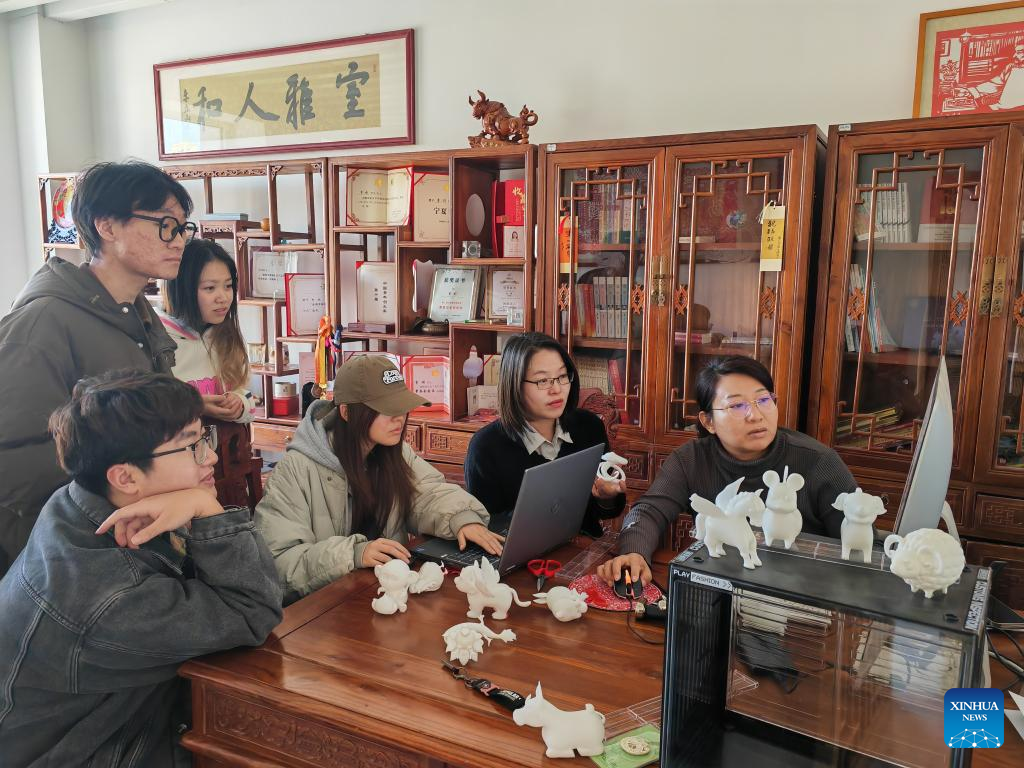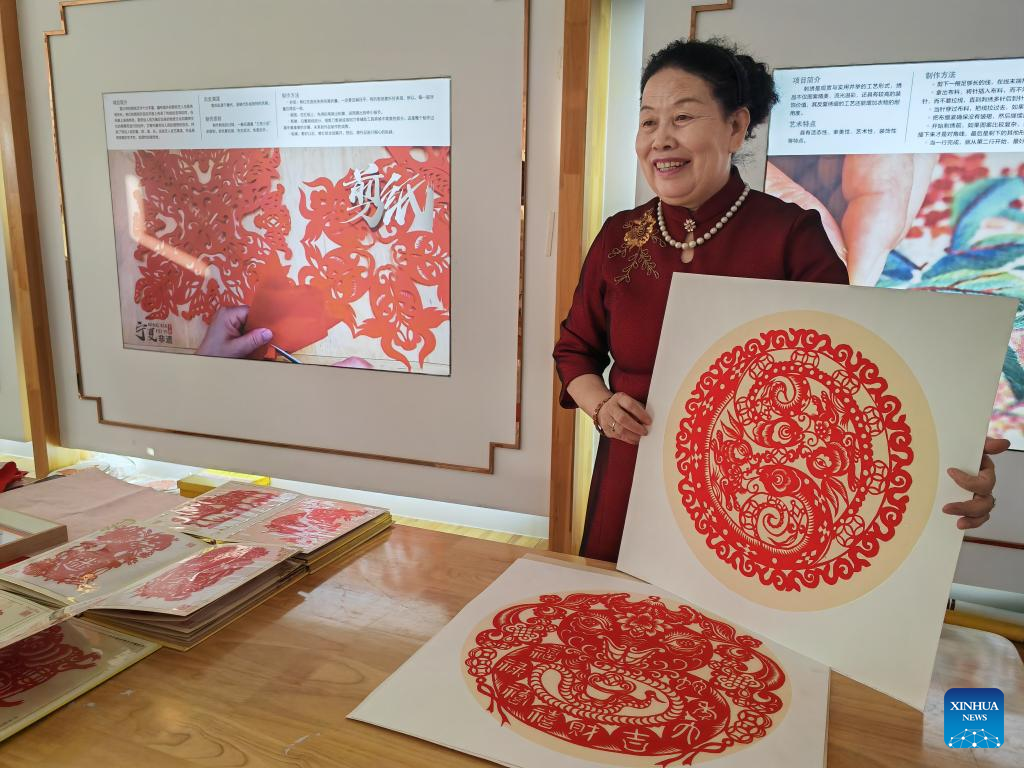
Li Jian (2nd R) and Chen Ling (1st R) work on optimizing the three-dimensional paper-cutting models based on the Chinese zodiac animals in Yinchuan, northwest China's Ningxia Hui Autonomous Region, Jan. 7, 2025. TO GO WITH "" (Xinhua/Liu Hai)
YINCHUAN, Jan. 21 (Xinhua) -- As the Chinese Year of the Snake approaches, Fu Zhao'e has been spending her days cutting and folding red paper to create snakes, numbers and other decorative designs, immersing herself in the joy of her craft.
The 65-year-old is a native of northwest China's Ningxia Hui Autonomous Region, and a practitioner of the paper-cutting craft of the Hui ethnic group, which is recognized as a national intangible cultural heritage.
When she spoke with Xinhua, she completed a snake paper cutting in celebration of the upcoming Year of the Snake, one of the 12 animals of the Chinese zodiac that record the years and reflect people's attributes.
"The snake symbolizes intelligence and versatility in the Chinese zodiac. Recently, I have been crafting various snake-themed paper cuttings to express my Spring Festival wishes," said Fu, who has been practicing the art form for five decades.
The Chinese folk art of paper cutting, or "jianzhi," is traditionally a craft mastered by women and used in ritual or home decoration. The art form has gained increased attention in recent decades and was included on the UNESCO Representative List of the Intangible Cultural Heritage of Humanity in 2009.
In 1960, Fu was born into a farming family in Ningxia's Haiyuan County. Her mother and grandmother were well-known local practitioners of paper cutting. During difficult times, they created window decorations in exchange for daily necessities.
"My grandmother passed down her paper-cutting techniques to my mother, and my mother to me," Fu said. "During Spring Festival, every household puts up window decorations of various motifs. When I was still learning, whatever my mother cut, I would follow suit."
After graduation from senior high school, Fu opened a small restaurant to earn a living. Despite her busy schedule, paper cutting remained her greatest passion.
After one of her paper cuttings was published in a local newspaper in 1983, Fu began submitting her paper cuttings for publication more frequently. Each piece that was published earned her a small supplementary income. She also participated in exhibitions and competitions, winning numerous awards.
In 1997, she was invited to showcase her paper-cutting techniques to tourists at the Zhenbeibu film studio, a tourist destination in the regional capital city of Yinchuan. She was soon able to create a paper cutting of a tourist within three minutes, and has made 100,000 such portraits over more than 20 years.
Fu narrates stories through her paper cuttings, including stories from mythology, Chinese literature classics and everyday life. "Making paper cuttings allows me to express the things I see and the thoughts in my heart," she said.
Under Fu's influence, her three daughters have mastered paper-cutting techniques and chosen art-related majors at university. Her second daughter, Li Jian, is the fourth generation of the family to practice the craft.
"My mother's generation stuck to craftsmanship, creating many meaningful works. As inheritors of the craft, our generation has the duty to preserve it, pass it down and carry it forward," Li said.
After graduating from university, Li returned to Ningxia to establish a cultural and creative studio, focusing on the industrial development of the art. She has since incorporated her mother's paper-cutting techniques into various cultural products, including wall calendars and silk scrolls.
Within a few years, she had developed the workshop into a cultural enterprise with annual sales reaching millions of yuan (1 million yuan is equivalent to about 139,464 U.S. dollars), training more than 1,000 women from rural areas to boost their incomes.
Recently, Li has been busy collaborating with a team led by Chen Ling, an associate professor of animation at Ningxia's North Minzu University, to optimize three-dimensional paper-cutting models based on the Chinese zodiac animals. The products are expected to hit the market before the Spring Festival, or the Chinese Lunar New Year that falls on Jan. 29 this year.
"Our intention is to bring paper cuttings to life. By integrating industry, academia and research, we aim to develop cultural and creative products such as blind boxes, promoting outstanding traditional culture in forms more appealing to modern audiences," Li said.
Li's son, 11-year-old Guo Zhongyao, has been learning paper cutting from his grandmother since he was 3 years old. He has been making paper cuttings inspired by the Year of the Snake in recent days, preparing for a family talent competition during the eight-day Spring Festival holiday.
"If someone is willing to learn, I am willing to teach," Fu said. "I will keep making paper cuttings, promoting the art form not only in China, but also to the world." ■

Fu Zhao'e shows her paper cutting work themed the Year of the Snake in Yinchuan, northwest China's Ningxia Hui Autonomous Region, Jan. 7, 2025. (Xinhua/Liu Hai)



